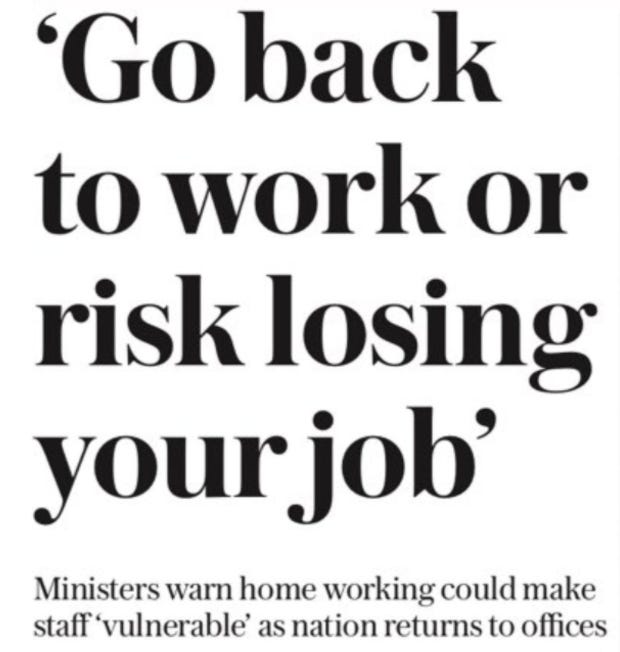The culture wars of work
ALSO: The latest data on remote working / bosses know remote is here to stay

A great, detailed study into remote working and productivity. Findings: 88% of those who have worked from home through the coronatimes want to continue in some capacity, almost half of (47%) want to work at home all of the time. 70% of workers say they got more done at home (reminder that the context of this is that many people were additionally dealing with children at home)
Outsourcing firm Capita to rid itself of a third of its offices
The biggest risk of catching coronavirus at work? Your lifts. "If 50% of people on a floor take lunch between 12 and 2pm, it would take up to 2½ hours to get everyone back in their seats again”.
In Silicon Valley firms are starting to pull out of their property leases - here’s news on Pinterest taking a $90m hit to exit theirs
Estate agents say that demand in the suburbs is seeing ‘insane’ growth
“The “Pret economy” was beginning to feel unsustainable even before the government promised stricter immigration controls on lower paid workers after Brexit… In 2017, Pret’s director of human resources told parliament that just one in 50 of its job applicants was British. Later that year, the Financial Times interviewed a Pret worker from Romania who woke at 3am to commute an hour and a half from East Ham to the branch in Waterloo. She was paid £16,000 a year”. (Another interesting fact from the piece, there were more Prets on Borough High Street than there are in Wales).
The culture wars of work

Over the last few months we’ve heard a lot about culture wars. Culture wars are conflicts between groups seeking to assert dominance of their values, often fought as phoney wars over topics that seem to be superficially unimportant but become totems in a dispute.
In Britain over the last week or so there was an invented culture war over an alleged ban of playing of Land of Hope & Glory at the Last Night of the Proms. As far as anyone could tell before this dead cat was thrown on the table no one cared a toss about the song being played. Two takes here, one Tory, one from the left:


Ash Sarkar said she was invited on TV to discuss the controversy, when she told the pre-broadcast researcher that her view was that it wasn’t a real issue, she didn’t know anyone who cared, the broadcaster told her they’d chosen to go with someone else. This is the cycle, a politician (or spin doctor) creates a story, then the media turn it into a real thing.
This time, by creating an angry episode that no one cared about it has mobilised a furious mob willing to step out to defend something that no one was seriously proposing to take away. Of course we’ve learned over the last five years how powerful anger can be as a call to arms. Make your audience angry, get the cortisol racing and your base of support feel more bonded to you.
Angries gathered on social media to organise getting down to Woolworths to buy Land of Hope & Glory to get it to the top of the charts. Some of them screaming with delight that they would be tuning in on Sunday to hear it reach Number 1 - presumably announced by Bruno Brookes, the actual chart in the real world now coming out on Friday afternoon of course. (Also, spoiler: it’s probably an illustration of how small and unrepresentative the angry mob really was, but the campaign for the single only got it to number 17 on the hit parade).
Worth reminding ourselves, that this entirely concocted thunderstorm of fury is part of a well observed pattern. Evidence suggests that these furious rows (frequently the creations of these Dominic Cummings style figures or invented because of newspaper proprietors’ personal annoyances) come before shifts in public opinion rather than as a response to them.
And all of this preamble because this week there was a series of attempts to forge a culture war about work.


Newspaper headlines screamed that workers needed to go back to work or risk losing their jobs*.

This baffling piece in the Telegraph suggested that workers needed to go back to the office to be visible, otherwise they were at risk of being fired. “One government source [again, this is newspaper code for someone like Cummings] said: “People need to understand that working from home is not the benign option it seems. We need workers to be alert to what decisions their bosses may take in the weeks ahead. If they are only seeing workers once a fortnight then that could prove problematic for some employees in the future”.
Just wow.
Of all of the arguments for going back to the office, just about the worst is presenteeism. ‘Go to the office and look busy’. Cummings goes on, “We want employees to be careful what working arrangements they accept. Suddenly the word ‘restructure’ is bandied about and people who have been working from home find themselves in the most vulnerable position”. If your grandmother said this you’d smile, roll your eyes to yourself, and say, ‘Nan, real life isn’t like that but thank you.’
What *is* true?
Well, without balance, as many people are starting to discover, remote working all the time can be incredibly lonely.
Additionally, people can be around people at home and feel alone.
Companies who need to be creative are finding it hard to exercise that muscle as easily remotely.
Long term, almost everyone is keen to be back to the office in some capacity.
All of this is true.
In a survey of Americans that is no doubt broadly true internationally, 75% of people say they have only one friend in their lives. Work provided company and a feeling of connection for many. All of these things are resolutely true. Getting back to the office to foster a sense of togetherness, of teamwork is going to be invigorating for companies and teams. But getting back to the office so you look busy and aren’t fired is shameful fear mongering. If we do one thing, it should be to avoid a culture war coming to the way we work. All of it is bizarre of course, because even on the government’s own advice 50-70% of workers need to work from home until Covid is resolved.
So, no more culture wars over work, let’s make the decisions based on the facts, not on the angry bluster of spin doctors.
* I don’t want to make this about newspapers needing people to be back on the daily commute to protect their influence but the current year-on-years are shocking: FT -55%, Metro -78%, Standard -42%, Daily Mail -15% (FYI: Telegraph were amongst the titles who chose to pull out of the audited figures).
More: I had a ding dong about this on LinkedIn when someone told me to wind it in.

Also: I did a piece for BBC Ideas about where the office & working goes from here.
Make Work Better is created by Bruce Daisley, workplace culture enthusiast. You can find more about Bruce’s book, podcast and writing at the Eat Sleep Work Repeat website. If you’re looking to facilitate a leadership discussion about work culture - or just a lunchtime talk to the team, get in touch!





